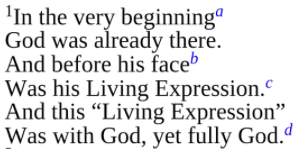John 1.1 reads:
Ἐν ἀρχῇ ἦν ὁ λόγος, καὶ ὁ λόγος ἦν πρὸς τὸν θεόν, καὶ θεὸς ἦν ὁ λόγος. (NA 28)
‘In the beginning was the Word, and the Word was with God, and the Word was God.’ (NASB)
But Brian Simmons, in his Passion [Anti-] Translation, has it as:
‘In the very beginning God was already there. And before his face was his Living Expression. And this “Living Expression” was with God, yet fully God.’
Note d reads:
Simmons claims that Christ:
had full participation in every attribute of deity held by God the Father.
Is this orthodox? I stand to be corrected, but I would have said that it is unorthodox to suggest that Christ has the attributes of deity only by participation, and not in His own right. In Simmons’ formulation, only the Father is said to hold the attributes of deity. Surely, the Son of God also has the attributes of deity Himself, in His own right, does He not?
It seems to me that there may be a connection between the doctrinal issue and the translation issue. I do not think that ‘Living Expression’ can stand on its own in the way that ‘Word’ can. In the first clause, just:
‘In the beginning was the Living Expression’
would be strange, it seems to me. ‘Expression of what, or of whom’, one seems bound to ask.
Again, in the second clause, Simmons replaces the article with the personal possessive pronoun to give ‘his Living Expression’ instead of ‘the Living Expression’.
And in the third clause, he adds the demonstrative pronoun ‘this’ and quotation marks, presumably because the phrase would not have stood well on its own, and needed to be referred back to ‘his Living Expression’ in the previous clause.
the first clause
Simmons’ first clause reads:
‘In the very beginning God was already there.’
Does the Almighty really want to tell us, through His holy word, that He was already there in the beginning? In Genesis 1.1, it is taken for granted that God already exists. Do we really need to be told that now, in the New Testament?
The answer is no, because this is not the real holy scripture. The true scripture reads:
Ἐν ἀρχῇ ἦν ὁ λόγος
which can reasonably be translated:
‘In the beginning was the Word’
and this is telling us something important that we need to know, namely that the Word, the logos, is eternal. Glory be to the Most High God, and to the eternal Word, the Son of God, who took flesh and dwelt among us; who died for our sins and raised us to a new and wonderful life in Him. Let us not change the holy scriptures on a whim and a fancy.
Andrew

